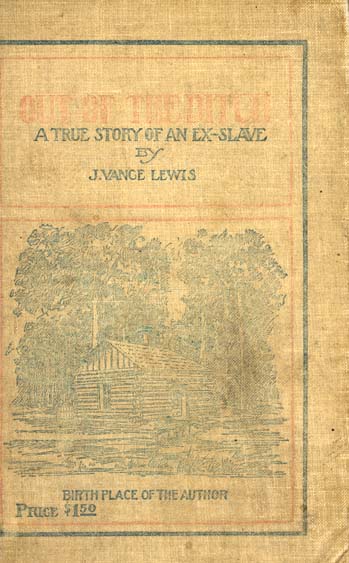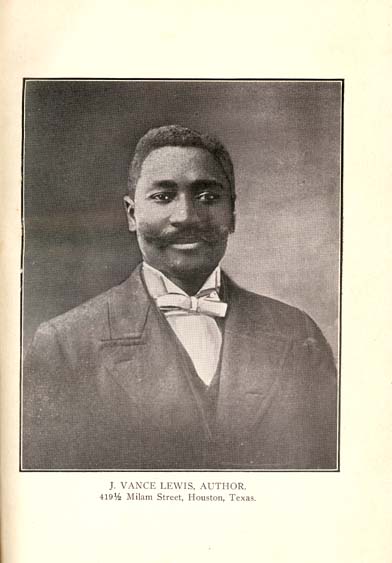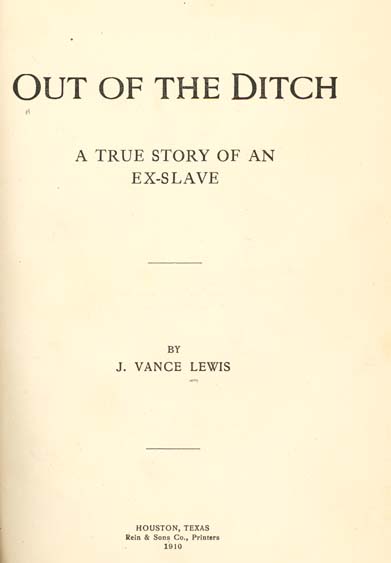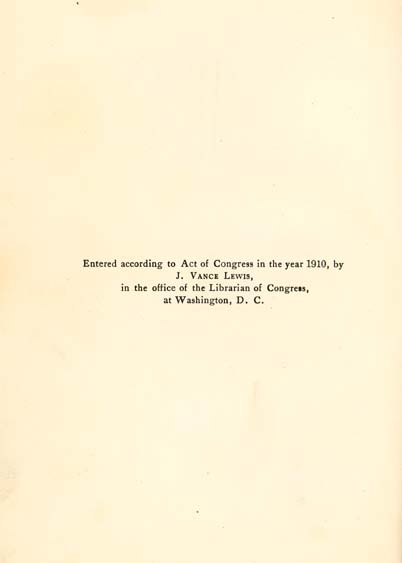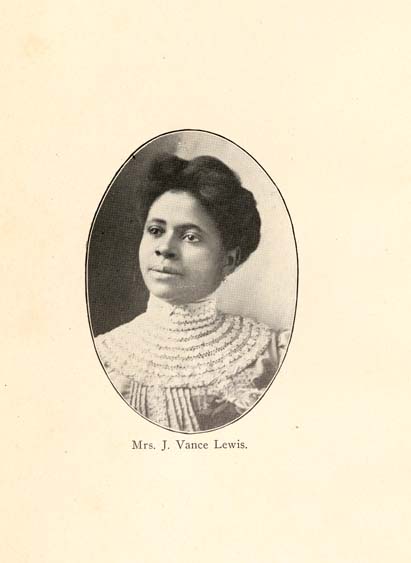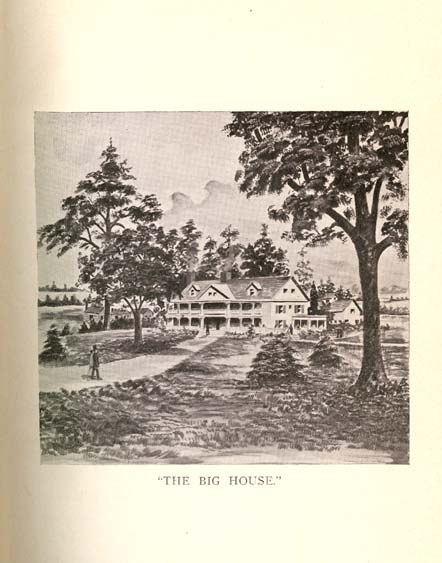Out of the Ditch.
A True Story of an
Ex-Slave:
Electronic Edition.
Lewis, J. Vance
Funding from the National Endowment for the Humanities
supported the electronic publication of this title.
Text scanned (OCR) by
David Faflik
Images scanned by
Natalia Smith and David Faflik
Text encoded by
Lee Ann Morawski and Natalia Smith
First edition, 2000
ca. 270K
Academic Affairs Library, UNC-CH
University of North Carolina at Chapel Hill,
2000.
Source Description:
(title page) Out of the Ditch; A True Story of an Ex-Slave
J. Vance Lewis
154 p., ill.
Houston, Texas
Rein & Sons Co., Printers
1910
Call number 923.473 (Perkins Library, Duke University)
The electronic edition is a part of the UNC-CH
digitization project, Documenting the
American South.
This electronic
edition has been created by Optical
Character Recognition (OCR). OCR-ed text has been compared against the
original document and corrected. The text has been encoded using the
recommendations for Level 4 of the TEI in Libraries Guidelines.
Original grammar,
punctuation, and spelling have been preserved. Encountered
typographical errors have been preserved, and appear in red type.
Any hyphens occurring
in line breaks have been
removed, and the trailing part of a word has been joined to
the preceding line.
All quotation marks,
em dashes and ampersand have been transcribed as
entity references.
All double right and
left quotation marks are encoded as " and "
respectively.
All single right and
left quotation marks are encoded as ' and ' respectively.
All em dashes are
encoded as
--
Indentation in lines
has not been preserved.
Running titles have
not been preserved.
Spell-check and
verification made against printed text using Author/Editor (SoftQuad) and Microsoft Word spell check programs.
Library of Congress Subject Headings, 21st edition, 1998
Languages Used:
- English
LC Subject Headings:
- Lewis, J. Vance.
- African Americans -- Biography.
- African American lawyers -- Texas -- Biography.
- Slaves -- Louisiana -- Biography.
- Freedmen -- Texas -- Biography.
- Discrimination in criminal justice administration -- United States.
- Slaves' writings, American -- Texas.
Revision History:
- 2001-10-26,
Celine Noel and Wanda Gunther
revised TEIHeader and created catalog record for the electronic edition.
-
2000-11-08,
Natalia Smith, project manager,
finished TEI-conformant encoding and final proofing.
-
2000-10-31,
Lee Ann MOrawski
finished TEI/SGML encoding
- 2000-10-25,
David Faflik
finished scanning (OCR) and proofing.
[Cover Image]
J. VANCE LEWIS, AUTHOR.
419 1/2 Milam Street, Houston, Texas.
[Frontispiece Image]
[Title Page Image]
[Title Page Verso Image]
OUT OF THE DITCH
A TRUE STORY OF AN
EX-SLAVE
BY
J. VANCE LEWIS
HOUSTON, TEXAS
Rein & Sons Co., Printers
1910
Page verso
Entered according to Act of Congress in the year 1910, by
J. VANCE LEWIS,
in the office of the Librarian of Congress,
at Washington, D.C.
Mrs. J. Vance Lewis.
[Second Frontispiece Image]
Page 1
THIS BOOK
IS LOVINGLY DEDICATED
TO MY
BELOVED AND FAITHFUL WIFE,
PAULINE R. LEWIS
Page 3
CONTENTS
- Chapter One: Birthplace . . . . . 1
- Chapter Two: Life on the Farm . . . . . 12
- Chapter Three: Doc Lewis Becomes Judge Lewis . . . . . 16
- Chapter Four: School Days . . . . . 22
- Chapter Five: College Life . . . . . 28
- Chapter Six: In the Courts of Illinois . . . . . 33 Chapter Seven: The Case of John Donovan . . . . . 38
- Chapter Eight: Henry Windgate's Murder Case in New York . . . . . 56
- Chapter Nine: Mrs. Florida Philips Tried for Murder in Indianapolis, Indiana . . . . . 66
- Chapter Ten: Before the Courts of Harris County, Texas . . . . .72
- Chapter Eleven: A Conspiracy . . . . . 83
- Chapter Twelve: A Trip to Europe . . . . . 86
- Chapter Thirteen: Home Coming . . . . . 91
- Chapter Fourteen: Nineteenth of June at Cameron, Texas . . . . . 100
- Chapter Fifteen: Into the Jaws of Death . . . . . 109
- Chapter Sixteen: Religious Parliament . . . . . 123
- Chapter Seventeen: Conflict With the Doctors . . . . . 137
- Chapter Eighteen: Home and Fireside . . . . . 153
ILLUSTRATIONS
- First Frontispiece: The Author.
- Second Frontispiece: Mrs. Pauline R. Lewis, to Whom the Book Is Dedicated.
- Third Frontispiece: The Big House.
- First Illustration: The Author and His Young Master, facing pp. 14-15.
- Second Illustration: The Trial of Rev. Benjamin by Judge Lewis for Hog Theft, facing pp. 20-21.
- Third Illustration: Isaac Carraway, the Trustworthy Old Servant of the South, facing pp. 26-27 .
- Fourth Illustration: Henry Windgate Meets His Mother and His Attorney in the Courts of New York, facing pp. 60-61.
- Fifth Illustration: H. H. Letheridge, L. Franks, Conferring With J. Vance Lewis; Miss Bernice Griggs, Stenographer; facing pp.74-75.
- Sixth Illustration: Mabel Jackson Kills Hamblen Rodgers (White), facing pp. 78-79.
- Seventh Illustration: C.E.W. Day, Chief Grand Mentor K. & D. of Tabor of Texas, facing pp. 84-85.
- Eighth Illustration: The Author in Prison, facing pp. 92-93
- Ninth Illustration: J. B. Brockman, a True Friend to the Author, facing pp. 94-95.
- Tenth Illustration: Rev. F. L. Lights, Rev. N.P. Pullum and J.B. Bell, Who Signed the Author's Bond, facing pp. 100-101.
- Eleventh Illustration: Mob at Liberty, Texas, Escorts the Author to the Train, facing pp. 110-111. [Illustration not available.]
- Twelfth Illustration: Biz Watts and Austin Polk, Life-Time Convicts, Reach Their Mother at the Depot, Corsicana, Tex., facing pp. 116-117. [Illustration not available.]
- Thirteenth Illustration: The Van Court, Residence of the Author, facing pp. 150-151. [Illustration not available.]
- Illustrated by the Texas Engraving Company,
Page 5
PREFACE.
The readers of this book may think it strange that we call it "Out of the Ditch," but it is a description of actual scenes and occurrences. Under slave conditions the author would have lived and died, both figuratively and actually, "in the ditch." Under condition of emancipation there was a chance to climb out and fight for life and liberty. This book contains a picture of slavery on a gigantic scale. There were many slave owners who were as thoughtful and as sympathetic as Mr. Cage and his son. There were some who were not and this difference in temperament as well as the difference of wealth and blood, led to the paradoxical views which the world held of slavery. I have written this little book not because I felt that there was serious need of another book, nor because I wish to boast of my own personal achievement, but because I felt that my struggles might inspire other boys to pursue their highest aspirations and be proof against discouragement. The stumbling blocks placed in my pathway may be layed in yours and if this book helps you to avoid them it will have accomplished its mission. I felt that "Out of the Ditch" might shed new light upon some of the difficult phases of the Negro problem, and might be the means of helping to change certain adverse conditions for the better. You will find some mistakes in the book, you may intice its leteran merits, but I am sure you will approve of its sincerity. Naturally in a work of this kind I have employed a good bit of ego, but I saw no way to avoid it in a simple relation of facts. Beseeching you to read carefully, and ponder thoughtfully every phase of the author's struggles and the causes therefor, whether of prejudice, jealousy, envy or conspiracy, we send this book into the world. Deal with it charitably and try to see the good rather than the bad it may contain. Into the warp and woof of every book the author weaves much that even the subtlest readers cannot fathom, far less understand. To such it is but a cross and a tangle of threads, but there is a golden thread running through the whole. Follow it and you will enter the spirit of "Out of the Ditch."
J. VANCE LEWIS
Page 6
OUT OF THE DITCH.
"The government of a nation itself is usually found to be but the reflex of the individuals composing it. The government that is ahead of its people will inevitably be dragged down to their level, as the government that is behind them will in the long run be dragged up. In the order of nature the collective character of a nation will as surely find its befitting results in its law and government as water finds its own level. The noble people will be nobly ruled, and the ignorant and corrupt ignobly. Indeed all experience serves to prove that the worth and strength of a state depend far less upon the form of its institutions than upon the character of its men. For the nation is only an aggregate of individual conditions and civilization itself is but a question of the personal improvement of the men, women and children of whom society is composed."
--Samuel Smiles.
"THE BIG HOUSE."
Page 7
OUT OF THE DITCH
A TRUE STORY OF AN
EX-SLAVE
CHAPTER I.
BIRTH PLACE AND LIFE ON THE FARM.
Have you ever visited a plantation with its long shady lane, hedged with evergreens and cedar trees, its flower gardens of holly-hocks and dahlias, princess-feathers and honey-suckle, its green lawn, neat, sweet and hospitable, partaking of and foretelling the spirit of the grand old mansion or "big house" which they so gloriously decorate? Did you ever sit upon the wide veranda over which trailed the yellow jessamine, scenting the air for miles around with its prodigious fragrance, and where the mistress sits and reads or knits and embroiders? Did you observe at the rear, across the clean-swept yard, stretching in orderly lines the cabins of the slaves, before the doors of which dance and sing numerous dark nymphs clad in one-piece suits and decorated with wreaths and garlands of wild flowers? To the right and left and in every direction stretch vast acres of farm land, black and fertile, but clothed with verdure rich and tall and magnificent.
It is a sugar plantation and the tall red stalks waved their leafy hands in a perfect rythm as the noisy slaves chant their numerous field songs. If you have seen such a place, then you
Page 8
know where I was born. It was down in Louisiana, and the plantation was owned by Colonel D.S. Cage, Sr. Whether the date of my birth interests you or not, I know that it was not passed by unheeded by my former master, for recorded upon the leaves of the family Bible, I find the following record: "Born of Doc and Rosa Lewis, on December the 25th, 18 . . ., a son, whose name is Joe, and whose birth has increased my personal property one thousand dollars."
So that I was a Christmas present to my master; but being born on a great day has its disadvantages, for one is in danger of being overshadowed or lost in oblivion because of the prominence given greater characters of events, and so this was a forecast of my future career, a struggle against Fate and Fortune to the great OUT OF THE DITCH. As a bare-foot boy, my stay upon the farm had been pleasant. I played among the wild flowers and wandered, in high glee, over hill and hollow, enchanted with the beauty of nature, and knew not that I was a slave, the son of slaves. Nor did I know that I was born at the moment where every note in the affairs of the government was one of discord that reconciliation was futile and that disruption and secession hung like a cloud over the nation.
Life to me had been a June day, filled with butterflies and mocking-birds. The serenity of my skies had never been obscured by a cloud, save those natural to childhood; but when about ten years old, I realized that I was not in accord with the older people; that they were not satisfied with conditions; that their skies were sad and gray. With them there was a longing for a mysterious something called freedom. I did not know what it was, and I do not think they full understood. I know
Page 9
they underrated its responsibilities. I observed them getting together in chimney corners and in other secret places whispering and talking earnestly and praying such prayers as I have never heard before, or since. My father and mother were among them and one day I heard my mother say over and over again: "Thank God, we are all free and G

